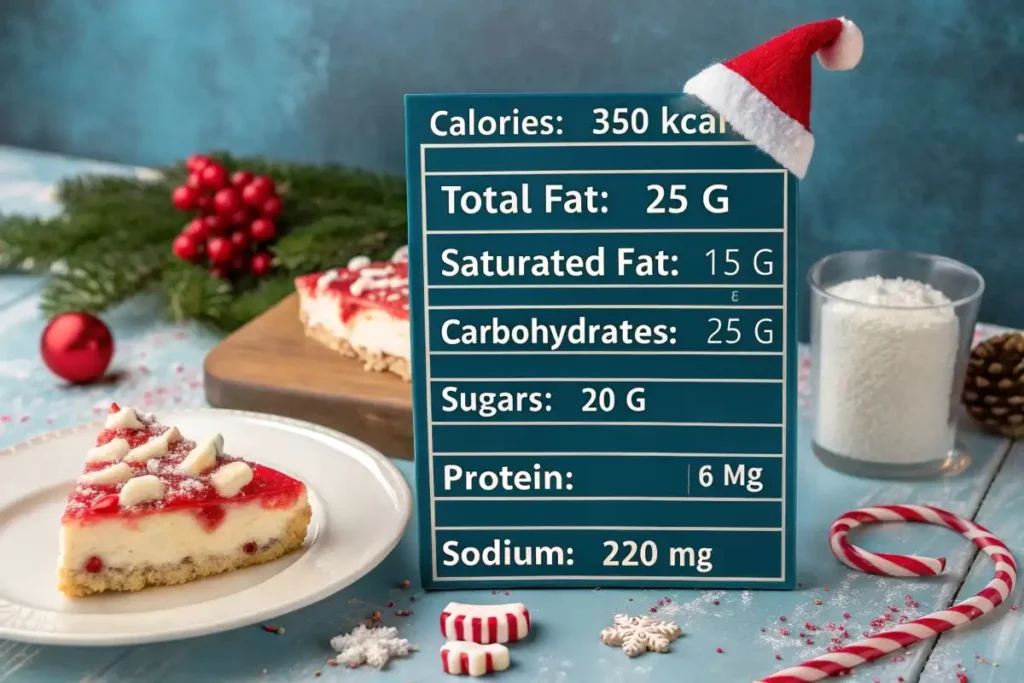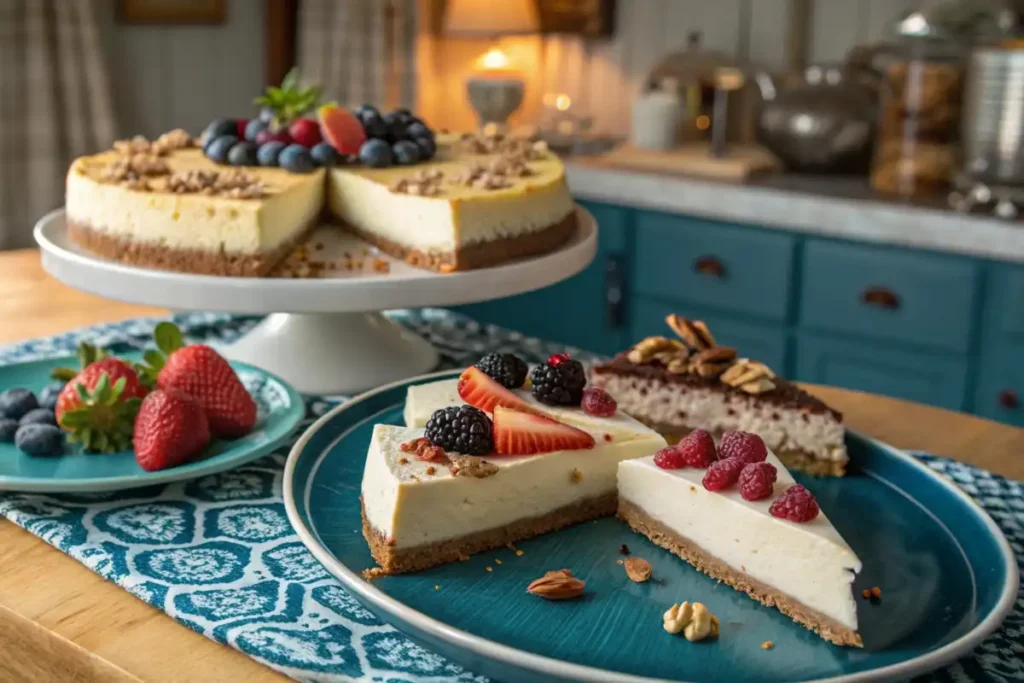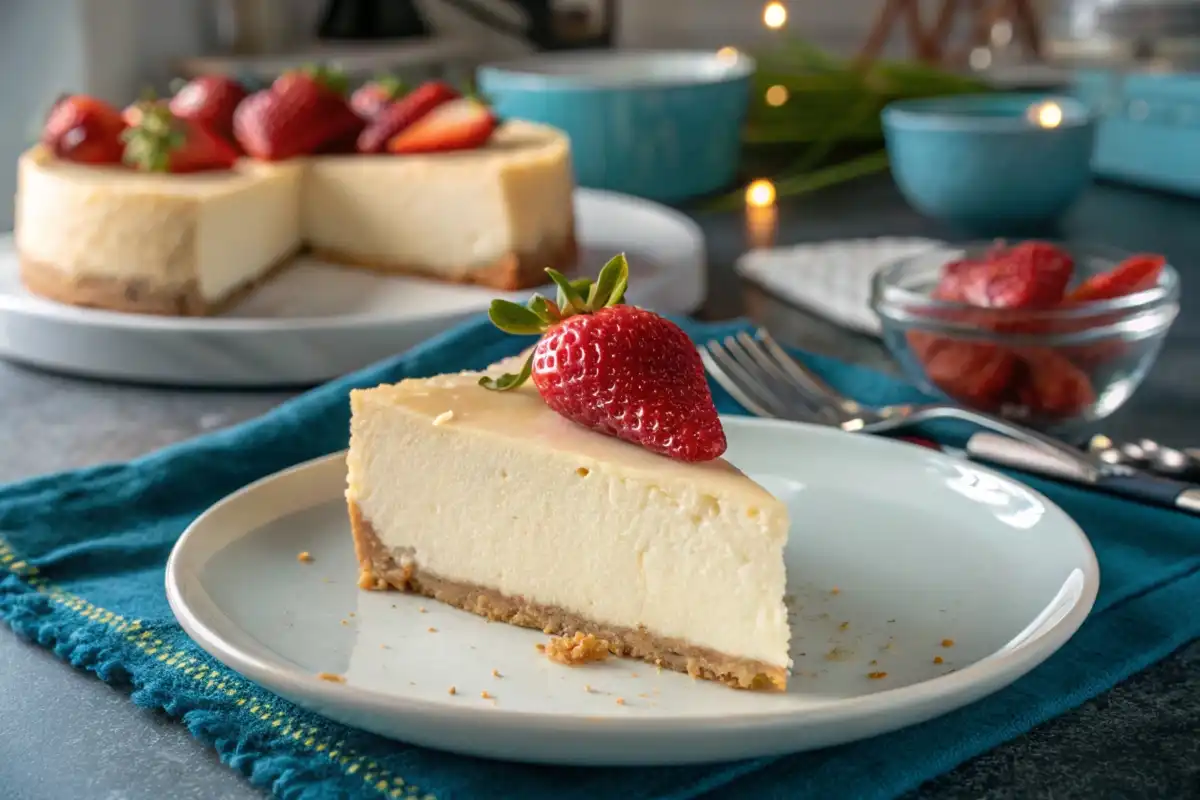At the present time, many dessert lovers ask is cheesecake good for you? This creamy, rich treat tempts many palates. However, cheesecake’s calorie content and sugar levels raise questions about health effects. In addition, dietary habits vary widely. Therefore, it’s important to understand cheesecake’s nutritional profile. Eventually, by examining ingredients, serving sizes, and healthier variations, you can enjoy cheesecake responsibly. To sum up, is cheese🍰 good for you? The answer depends on moderation, ingredients, and your overall diet.
The Nutritional Profile of Cheesecake
To understand is cheesecake good for you?, consider its main components. Traditional cheesecake typically contains cream cheese, eggs, sugar, and a crust of butter and graham crackers. Therefore, it’s rich in fat and sugar. In contrast, some healthier versions may use lighter dairy or alternative sweeteners.
Key Ingredients in Standard Cheesecake:
- Cream Cheese: High in fat, provides creamy texture and flavor.
- Sugar: Adds sweetness but also increases calorie load.
- Eggs: Contribute protein and structure.
- Crust (often graham cracker-based): Adds carbs, butter, and crunch.
- Flavorings (vanilla, lemon zest, or cocoa): Enhance taste without large nutrient changes.
In addition, variations exist. Some recipes use Greek yogurt or low-fat cream cheese. Others reduce sugar with natural sweeteners. Hence, the nutritional impact depends on the recipe.
Calorie Content and Serving Size
At the present time, a typical slice of cheesecake is calorie-dense. Because it contains rich dairy and sugar, a single slice can provide hundreds of calories. For instance, a standard 3.5-ounce (100g) slice may contain around 300-400 calories. Therefore, portion control matters. In contrast, a lighter cheese🍰 made with reduced-fat ingredients can cut calories.
Pro Tip:
Instead of eating a large slice, consider a smaller portion. Add fresh fruit on top to boost flavor. Eventually, your body will thank you for mindful choices.
Nutritional Data for a Standard Slice of Cheesecake
Below is approximate nutritional data for one standard slice (about 1/12 of a 9-inch cheesecake):
| Nutrient | Approx. Amount per Serving |
|---|---|
| Calories | ~350 kcal |
| Total Fat | ~25 g |
| Saturated Fat | ~15 g |
| Carbohydrates | ~25 g |
| Sugars | ~20 g |
| Protein | ~6 g |
| Sodium | ~220 mg |
| Fiber | ~1 g |

Note: Values vary based on recipe and portion size. Because many cheesecakes differ, always check actual ingredients.
Considering the Fats in Cheesecake
Because cheesecake typically uses cream cheese and sometimes heavy cream, it’s high in saturated fat. In contrast to unsaturated fats, saturated fats can affect heart health if consumed in large amounts. However, occasional indulgence is not catastrophic. Therefore, it’s about balance, not complete avoidance.
Tips to Limit Saturated Fat:
- Choose low-fat cream cheese or Greek yogurt-based cheesecakes.
- Serve smaller slices.
- Pair with a side of berries or a light salad.
At the present time, enjoying cheesecake in moderation aligns with a balanced lifestyle.
Sugar Content and Blood Glucose Levels
Sugar levels play a key role when asking is cheesecake good for you? Because traditional recipes use refined sugar, each slice often contains significant sweetness. In addition, consuming high-sugar desserts regularly can affect blood glucose levels. Eventually, this may impact weight and overall health.
Alternatives for Lower Sugar:
- Use reduced-sugar recipes with stevia or monk fruit.
- Add fresh fruit toppings for natural sweetness.
- Pair with unsweetened tea or coffee.
In conclusion, reducing sugar intake without sacrificing flavor can make cheesecake a more balanced treat.
Cheesecake’s Protein Contribution
Cheesecake does contain some protein from eggs and dairy. However, the amount is relatively small compared to its fat and carbohydrate content. For instance, a slice may offer around 6 grams of protein. In addition, protein supports muscle maintenance and helps keep you full. However, cheese🍰 should not be your primary protein source.
Improve Protein Content:
- Use Greek yogurt or cottage cheese instead of cream cheese.
- Top with chopped nuts for extra protein and healthy fats.
Therefore, you can slightly boost protein levels, but remember that cheesecake remains a dessert.
Vitamins and Minerals
Cheesecake provides some vitamins and minerals, mainly from dairy and eggs. For example, it may contain small amounts of calcium, vitamin A, and B vitamins. However, these nutrients don’t justify indulging too often. In contrast, fruits, vegetables, and lean proteins offer more nutrient density. Eventually, if you rely on cheesecake for vitamins, you’ll likely fall short.
Enhance Nutrient Value:
- Top cheesecake with fresh strawberries or blueberries.
- Choose recipes that incorporate pumpkin or pureed fruit.
- Add a sprinkle of chia seeds for extra fiber and minerals.
In conclusion, cheesecake is not a nutrient powerhouse, but small tweaks help.
Weight Management and Portion Control
At the present time, many ask is cheesecake good for you? in the context of weight management. Because cheesecake can contribute extra calories, frequent large portions make weight loss harder. However, enjoying a moderate slice occasionally can fit into a balanced diet. Therefore, controlling portion size is key.
Strategies for Portion Control:
- Serve yourself a small slice rather than a large wedge.
- Share dessert with a friend or family member.
- Savor each bite and eat slowly.
- Avoid having cheesecake every day; save it for special occasions.
Eventually, it’s the overall pattern of your diet, not a single slice, that matters.
Dietary Preferences and Cheesecake
Different dietary preferences shape the answer to is cheesecake good for you? For instance, those following low-carb diets might consider cheesecake high in carbs. In contrast, individuals focused on protein may find it lacking. However, creative substitutions can accommodate various eating styles.
Dietary Adaptations:
- Gluten-Free: Use gluten-free crust options.
- Low-Sugar: Choose sugar substitutes or fruit-sweetened versions.
- High-Protein: Blend Greek yogurt and add whey protein.
- Low-Fat: Opt for reduced-fat dairy and minimal crust.
Therefore, cheesecake can adapt to different dietary goals, making it more suitable for a range of lifestyles.
The Role of Cheesecake in a Balanced Diet
When considering is cheesecake good for you?, think of balance. In a balanced diet, most foods should provide essential nutrients. However, occasional treats help maintain dietary satisfaction. At the present time, many nutrition experts emphasize moderation over strict avoidance.
Incorporation Tips:
- Enjoy cheesecake as a treat once or twice a month.
- Include plenty of fruits, vegetables, lean proteins, and whole grains daily.
- Balance dessert intake with regular physical activity.
Eventually, dessert is not the enemy. A balanced approach supports both health and enjoyment.
Healthier Cheesecake Variations
In contrast to traditional recipes, lighter versions can improve the cheesecake’s nutritional profile. For example, swapping heavy cream with Greek yogurt reduces fat and adds protein. In addition, using almond flour crust instead of graham crackers can lower carbs and boost fiber.
Healthier Recipe Ideas:
- Greek Yogurt Cheesecake: Replace cream cheese partially with Greek yogurt.
- No-Bake Fruit-Topped Cheesecake: Use fresh berries and less sugar.
- Protein Cheesecake: Mix in protein powder and use a reduced-fat crust.
- Vegan Cashew Cheesecake: Opt for plant-based ingredients, lowering saturated fat.
Therefore, experimenting in the kitchen can yield tasty cheesecakes that fit better into your diet.

Comparing Cheesecake to Other Desserts
Is cheesecake better or worse than other sweets? Because it’s rich in dairy fat and sugar, it’s not the lightest option. However, many desserts contain similar or even higher sugar and saturated fat levels. For instance, a chocolate fudge cake may have more sugar. In contrast, a fruit sorbet often has fewer calories but can still be high in sugar.
Dessert Comparison:
- Cheesecake vs. Chocolate Cake: Cheesecake may have more fat but could have fewer added sugars.
- Cheesecake vs. Ice Cream: Ice cream can be lower in calories per serving, but it’s easy to eat more.
- Cheesecake vs. Fruit Salad: Fruit salad is nutrient-dense and lower in calories.
In conclusion, cheesecake sits somewhere in the middle. It’s not the healthiest dessert, but it’s not always the worst.
Emotional and Psychological Factors
Desserts like cheesecake often provide comfort. Enjoying sweet treats in moderation can support emotional well-being. In addition, strict deprivation sometimes leads to binge eating. Therefore, a small slice of cheesecake might help maintain a positive relationship with food.
Balanced Mindset:
- Avoid labeling foods as “good” or “bad.”
- Practice mindful eating and savor flavors.
- Allow occasional indulgences guilt-free.
Eventually, a healthy mindset around desserts makes them easier to manage long-term.
Health Conditions to Consider
For some individuals with health conditions, the question is cheesecake good for you? becomes more complex. For instance, those with lactose intolerance must choose lactose-free dairy. In contrast, individuals managing type 2 diabetes must watch carb and sugar intake carefully. Therefore, personal health circumstances affect your cheesecake choices.
Adjustment Suggestions:
- Diabetics: Use sugar substitutes or limit portion size.
- Heart Health: Pick reduced-fat versions and add fruit toppings.
- Lactose Intolerance: Opt for lactose-free cream cheese or vegan versions.
In conclusion, tailor cheesecake consumption to your unique health needs.
Pairing Cheesecake with Other Foods
At the present time, pairing cheesecake with nutrient-rich foods can create balance. For example, enjoy a small slice with a side of fresh berries. This adds fiber, vitamins, and antioxidants. In addition, drink water or unsweetened tea to reduce sugar overload. Eventually, these choices help moderate the dessert’s impact on your daily intake.
Smart Pairings:
- Fresh fruit (berries, sliced peaches)
- Unsweetened green tea
- A handful of nuts (walnuts, almonds)
- Plain Greek yogurt topping
In conclusion, pairing cheesecake wisely makes it a more balanced dessert experience.
Fun Twist: A Quick Cheesecake Joke
Let’s take a light moment to sweeten our topic:
Joke:
Why did the slice of cheesecake join a fitness class?
Because it wanted to get “whipped” into better shape!
(We know it’s cheesy, but so is the cake!)
Frequency of Cheesecake Consumption
Moderation is key. Consuming cheesecake daily likely won’t support your health goals. However, having it as an occasional dessert, perhaps once a week or less, fits many diets. In addition, consider the rest of your meals that day. If you had lighter, veggie-rich meals, a small cheesecake treat can fit in more easily.
Frequency Guidelines:
- Once a week in small portions for active individuals.
- Twice a month if you’re watching calories closely.
- Special occasions if you have strict health goals.
Eventually, find a frequency that aligns with your personal lifestyle.
Exercise and Cheesecake
Regular physical activity can offset occasional indulgences. Because exercise burns calories and supports metabolism, enjoying a slice of cheesecake after a workout might feel more justified. However, avoid viewing exercise as punishment for eating dessert. Instead, think of it as part of an overall balanced life.
Tips for Balancing Exercise and Dessert:
- Schedule a workout on the day you plan to enjoy cheese🍰.
- Incorporate strength training to build muscle and support metabolism.
- Use non-food rewards for fitness achievements.
In conclusion, exercise helps you maintain a flexible, enjoyable approach to eating cheese🍰.
Addressing the Key Question: Is Cheesecake Good for You?
Is cheese🍰 good for you? The direct answer: Cheese🍰 is not a health food. However, it can fit into a balanced diet if consumed in moderation. At the present time, dietary guidelines focus on overall patterns rather than single foods. Therefore, the occasional cheese🍰 slice enjoyed as part of a balanced meal plan is unlikely to harm most people’s health.
In contrast, eating large portions regularly may contribute to weight gain and other health issues. Eventually, individual factors such as metabolism, activity level, and personal health conditions matter. To sum up, cheese🍰 can be good for the soul when enjoyed responsibly, but it’s not a daily nutritional staple.
Frequently Asked Questions (FAQs)
(No specific PAA questions were provided, so we will create related FAQs.)
Q: Is cheesecake healthy compared to other desserts?
A: In contrast to lighter desserts like fruit salad, cheese🍰 is higher in fat and sugar. However, it may be similar or slightly lower in sugar than some rich cakes. Eventually, moderation is crucial.
Q: Can I lose weight and still eat cheesecake?
A: Yes, you can. Because weight loss depends on a calorie deficit, enjoy small portions occasionally. Balance your diet, exercise regularly, and stay mindful of portions.
Q: What is the oldest cheesecake?
The earliest known form of cheesecake dates back to ancient Greece. Historians believe it may have been served to athletes during the first Olympic Games in 776 B.C. Over time, the dessert spread throughout Europe and evolved into the creamy, rich varieties we enjoy today…
Q: Does no-bake cheesecake expire?
Yes. Even though it isn’t baked, a no-bake cheesecake will eventually expire. When stored properly in the refrigerator, it typically stays fresh for about 3–5 days. Always keep it chilled and check for signs of spoilage, such as an off smell or changes in texture, before eating…
Q: Can I freeze a cheesecake?
Yes, most cheesecakes freeze very well. Wrap the cheesecake tightly in plastic wrap and then in aluminum foil before placing it in the freezer. When you’re ready to enjoy it, thaw it in the refrigerator overnight for the best texture and flavor…
Q: Is cheesecake good for you if you have diabetes?
A: If you have diabetes, limit cheesecake’s sugar and portion size. Consider recipes with sugar substitutes and pair with protein-rich foods. Always follow medical guidance.
Conclusion
Is cheese🍰 good for you? The answer depends on frequency, portion size, and ingredient quality. In addition, a balanced diet with plenty of nutrient-rich foods leaves room for occasional treats like cheese🍰. Therefore, enjoy a small slice as part of a well-rounded lifestyle. Eventually, listen to your body, practice moderation, and savor every creamy bite. To sum up, cheese🍰 can be a delightful indulgence when enjoyed responsibly, supporting both taste and overall well-being.
